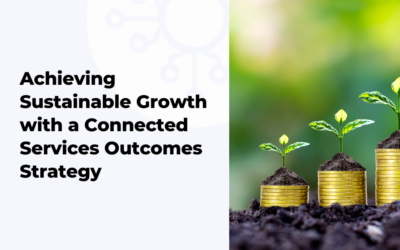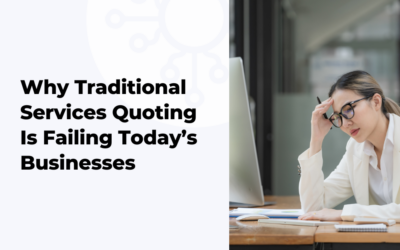Numerous tools and technologies utilized by service-based businesses were initially created to address the specific difficulties faced by product companies. As a result, these tools and technologies may not be adequate for the achievement of modern professional service organizations, which are characterized by their complexity and dynamic nature. In a recent interview with Tech Leaders Podcast, Provus Co-Founder and CEO Mahesh Baxi explains why service companies should add transformative methods like AI-led services quoting to the mix.
Services quoting on disconnected systems
Running professional services using disconnected spreadsheets, emails, and applications is no longer a competitive option. To execute efficiently and profitably, you need visibility, transparency, and control over the quoting process: scope discovery, estimation, quoting, building multiple scenarios, and drafting SOWs. Time, cost, and engagement are critical elements that must be tracked throughout the quote-to-cash process. This is where Provus’s AI-led Services CPQ Platform can help remove the guesswork. You receive intelligent recommendations based on your company data and visibility over the entire workflow to help you execute each step accurately and flag any variances. The result? Revenue maximization and margin optimization
So why can’t product CPQ be used for services quoting?
With a product, the price waterfall method can be applied. The sales team starts with the list price, applies a set of discounts, factors in tiers and number of users, and arrives at a “customized” pricing plan that allows them to realize how much they’re bagging with every deal. For example, for ERP software, a typical quote would consider the number of users and subscriptions and the duration of the contract in addition to discounts. But for a service such as implementing the ERP software, the scope becomes much more complex and the pricing isn’t as straightforward—several dimensions need to be factored in. Scope discovery, number of processes to be automated, number of integrations to be included, building the workflow, etc.—that’s just one dimension. Another dimension would involve determining the mix of resources to be deployed for the implementation–seniority levels, locations, and the ability to ramp up or down while still delivering within scope. All these factors make services quoting both unique and complex. Moreover, several rounds of negotiations take place before a deal is finalized. Offering discounts is complex since revenue realization is not straightforward. A subscription sold for $1 million does not translate directly into the service costing $1 million. Here, we want to share the example of a customer who mentioned that, by the time negotiations for a service offering were complete, 55 different versions of spreadsheets over six months had been generated. This meant that no one really could tie the discount to revenue leakage or better pricing opportunities. In other words, the customer had no way to see if they were underselling their highly qualified resources by offering discounts. Overall, there was little visibility over how the deal was closed or what negotiations had happened.
This brings us to AI-led services quoting: Version 1.0 and Version 2.0.
Version 1.0: The services quoting automation journey has three phases:
- acquiring the data
- organizing it in a meaningful way, and
- analyzing it for insights.
Most companies–even the enterprise-level ones–perform these steps using Excel sheets. And they struggle to acquire data in a format that is intelligent and can make use of historical information. Thus, version 1.0 lacks a critical aspect, which is where AI-led version 2.0 comes into the picture.
Version 2.0 – After the analysis of the data, the fourth phase of the journey involves prediction. Continuing with the example of the ERP implementation that we mentioned previously, imagine you have sold and executed hundreds of such projects. Provus integrates with professional services automation tools and extracts information on sales margins, negotiation workflows, work breakdown structures, and resource utilization. Now, the AI engine consumes the data and offers meaningful insights and recommends scenarios for maximum revenue realization. When the sales team is equipped with these insights, the margin optimization possibilities are endless! In the services industry, it is well-known that even 1% margin optimization can lead to a 12-15% increase in the topline revenue. However, in services quoting, most companies do not have data in a structured format that AI systems can ingest to deliver predictions. To leverage AI in the quote-to-cash process, companies must first cover the version 1.0 journey before Provus can work with them to enhance predictions.
The future of AI-led services quoting in Salesforce with Provus
How is Provus in a unique position to enable service transformation, margin optimization, revenue maximization for PSOs? Provus is built natively on the Salesforce platform, which means that it provides a seamless user experience for companies using Salesforce Sales Cloud and Revenue Cloud. However, you don’t have to be a Salesforce user to employ Provus since it offers OEM licenses for users of other CRM platforms. Since the ecosystem is driven by Salesforce, Provus is fully integrated with opportunity management. More often than not, the services quoting process starts with the sales team adding line items and moving on to figuring out scoping, estimates, quotes, and scenario modeling. As you move on to the negotiation stage, Provus continues to support you by integrating with your professional services automation platforms like NetSuite OpenAir and Kimble. Besides, Provus also integrates with downstream platforms that handle invoicing and billing. Thus, it collects both upstream and downstream data to provide meaningful recommendations. In simple terms, Provus is purpose-built for services quoting and its AI-led guided selling transforms the way enterprises quote for their services. Leading service organizations such as NewRocket, Coastal Cloud, and A5 are using Provus’s Salesforce native services quoting platform to optimize their margins and maximize revenue.








